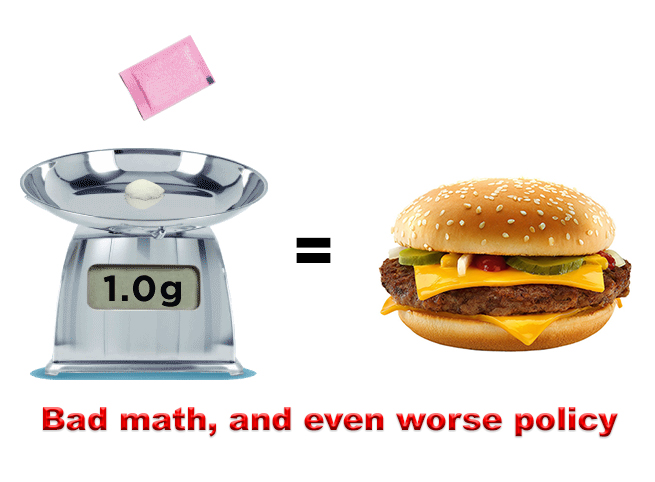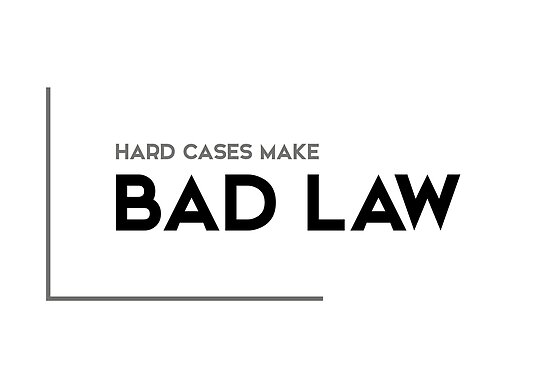We post news and comment on federal criminal justice issues, focused primarily on trial and post-conviction matters, legislative initiatives, and sentencing issues.

A TRIO OF FAIR SENTENCING ACT DECISIONS
 The Fair Sentencing Act, passed in 2010 (“FSA”) reduced the horrific 100:1 crack-to-powder ratio previously enshrined in the law, a policy that meant that one gram of cocaine base was sentenced as though it were a quarter-pound of cocaine powder. This vestige of the crack panic, passed in the Anti-Drug Abuse Act of 1988, meant that defendants convicted of crack received much longer sentences than those who sold cocaine powder. And – because crack was primarily sold by black defendants while powder was primarily sold by white defendants – all of that resulted in a gross racial disparity in sentencing and imprisonment.
The Fair Sentencing Act, passed in 2010 (“FSA”) reduced the horrific 100:1 crack-to-powder ratio previously enshrined in the law, a policy that meant that one gram of cocaine base was sentenced as though it were a quarter-pound of cocaine powder. This vestige of the crack panic, passed in the Anti-Drug Abuse Act of 1988, meant that defendants convicted of crack received much longer sentences than those who sold cocaine powder. And – because crack was primarily sold by black defendants while powder was primarily sold by white defendants – all of that resulted in a gross racial disparity in sentencing and imprisonment.
You can read more of the background here.
But the Fair Sentencing Act was not retroactive. That is, it did nothing for people already sentenced under the 100:1 ratio. As I recall, the compromise in the Senate that led to the FSA being passed was that it not be retroactive, a deal needed to get then-Sen. Jefferson Beauregard Sessions III (R-Alabama) aboard. While I find no contemporaneous reports saying as much, Sen. Sessions did kill the 2015 Sentencing Reform and Corrections Act because it sought to make FSA retroactive, and his opposition to the First Step Act is well recalled. So I’m probably right.

At any rate, Section 404 of the First Step Act finally made the FSA retroactive, and litigation about that section continues. Here are three very recent examples:
Case 1: Over 10 years ago, Ralphfield Hudson was convicted of selling cocaine powder and crack. After First Step made the FSA retroactive, Ralphie sought a sentence reduction, which his district court denied after concluding that the First Step Act did not permit the court to reduce a sentence for either a non-covered offense that is grouped with a covered offense or a covered offense when the defendant’s Guidelines range was unaltered by the Fair Sentencing Act.
Ten days ago, the 7th Circuit reversed Ralph’s denial, holding that if a defendant’s aggregate sentence includes both covered and non-covered offenses, a district court may reduce the sentence for the non-covered offenses, and even if the FSA did not alter the Guidelines range for a defendant’s covered offense, the district court may reduce the sentence for uncovered offense.
Case 2: Vincent Corner did his time on a crack case, but then violated his supervised release by using drugs. The judge gave him another 18 months and some more supervised release time after that.
While Vince was serving his supervised release violation, the First Step Act passed, and Vince applied for retroactive FSA credit on his underlying sentence. The district judge denied him, saying that “deciding whether Vince was eligible for relief under the First Step Act was unnecessary because the court would deny his request for a reduction even if he was.”
 Last week, the 7th Circuit reversed. First Step contemplates a “full review” for retroactive FSA relief, the Circuit said. The requirement that a Sec. 404 motion get a “complete review” suggests “a baseline of process that includes an accurate comparison of the statutory penalties – and any resulting change to the sentencing parameters – as they existed during the original sentencing and as they presently exist… A resentencing predicated on erroneous or expired guideline calculation or a decision to decline resentencing without considering at all the guidelines, would seemingly run afoul of Congressional expectations.”
Last week, the 7th Circuit reversed. First Step contemplates a “full review” for retroactive FSA relief, the Circuit said. The requirement that a Sec. 404 motion get a “complete review” suggests “a baseline of process that includes an accurate comparison of the statutory penalties – and any resulting change to the sentencing parameters – as they existed during the original sentencing and as they presently exist… A resentencing predicated on erroneous or expired guideline calculation or a decision to decline resentencing without considering at all the guidelines, would seemingly run afoul of Congressional expectations.”
Case 3: Chandar Snow was convicted in 1998 of the 21 USC 848(e)(1)(A) offense of murdering someone while engaged in a violation of 21 USC 841(a) and (b)(1)(A), in this case, a conspiracy to distribute 50 grams or more of crack. He got life in prison for the offense. After the Fair Sentencing Act was made retroactive, his underlying drug crime was no longer punishable as an 841(b)(1)(A) offense, because the conviction was not for 280 grams or more.
Chandar took a chance. He argued that under the FSA – made retroactive by § 404 of the First Step Act – meant he no could be guilty of an 848(e)(1)(A) killing offense. The district court turned him down, and refused to lift the life sentence. Last week, the 6th Circuit agreed.
 The question is whether Chandar’s 848(e)(1)(A) is a “covered offense” under Sec. 404. The provision says a “covered offense” is a violation of a Federal criminal statute, the statutory penalties for which were modified by the FSA. “Modified” means reduced by some degree, the 6th said. Here, the FSA did not reduce the sentencing range that applied to the conviction for murder while engaged in a conspiracy to distribute 50 grams of crack. Instead, after the FSA, “those elements no longer amount to an offense under § 848 at all and there is no applicable statutory sentencing range. The elimination of statutory penalties cannot be called a ‘modification’ of statutory penalties without putting great strain on the ordinary meaning of the word ‘modify’.”
The question is whether Chandar’s 848(e)(1)(A) is a “covered offense” under Sec. 404. The provision says a “covered offense” is a violation of a Federal criminal statute, the statutory penalties for which were modified by the FSA. “Modified” means reduced by some degree, the 6th said. Here, the FSA did not reduce the sentencing range that applied to the conviction for murder while engaged in a conspiracy to distribute 50 grams of crack. Instead, after the FSA, “those elements no longer amount to an offense under § 848 at all and there is no applicable statutory sentencing range. The elimination of statutory penalties cannot be called a ‘modification’ of statutory penalties without putting great strain on the ordinary meaning of the word ‘modify’.”
Thus, Chandar’s 848(e)(1)(A) conviction could not be considered a “covered offense” under § 404, and he was not entitled to a sentence reduction.
Chandar thus came to understand that no court was going to find a way to release someone guilty of murder when it could find a technical reading of the statute to avoid that outcome. Hard cases do indeed make bad law.
United States v. Hudson, 2020 U.S. App. LEXIS 22887 (7th Cir. July 22, 2020)
United States v. Corner, 2020 U.S. App. LEXIS 23387 (7th Cir. July 24, 2020)
United States v. Snow, 2020 U.S. App. LEXIS 23929 (6th Cir. July 29, 2020)
– Thomas L. Root

